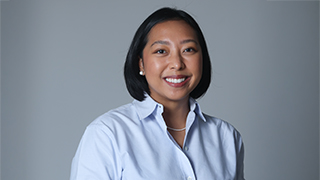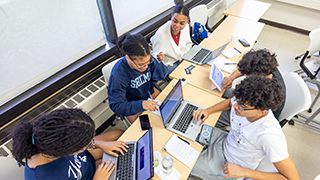DataLab Continues to Provide Students with Data Research Opportunities and Support
Monday, May 12, 2025
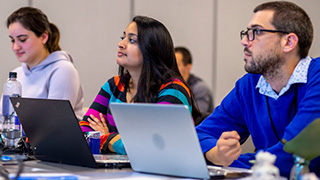 The DataLab is a grant-funded initiative created and established by the Research Data Services team at Seton Hall University Libraries. It provides students with structured research
opportunities with faculty-led research projects across multiple disciplines. This
helps them develop expertise in data analysis, visualization and computational methodologies.
The DataLab is a grant-funded initiative created and established by the Research Data Services team at Seton Hall University Libraries. It provides students with structured research
opportunities with faculty-led research projects across multiple disciplines. This
helps them develop expertise in data analysis, visualization and computational methodologies.
Each student is required to attend relevant Data Services workshops, and also engage in individual consultations with the Data Services Team. Currently funded by the Carolyn Jane Scott Charitable Trust, DataLab was launched in Spring 2022. So far, it has sponsored 42 projects across disciplines ranging from biology to psychology.
This semester, Patrick Bernet, Ph.D., assistant professor in the Department of Interprofessional Health Sciences and Health Administration, is sponsoring two students for the DataLab, Frank Pettorini and Emily Barbera. Frank and Emily are students in the Master of Healthcare Administration program, looking to gain experience in data analysis and visualization. Both students’ projects use the same datasets, and Samah Alshrief, Ph.D., data specialist, helped them with DataLab procedures and coding. Emily and Frank presented their research at the 2025 Petersheim Academic Exposition at the end of April.
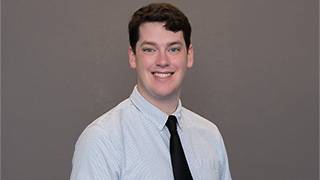 Frank’s work with DataLab stems from his interest in data analysis and expanding his
visualization and analytical skills. His project, entitled Data Visualization Tools for Pregnancy Outcomes, explores the use of data visualization to display pregnancy outcomes, searching
for a correlation between various demographics such as race, socioeconomic status
and baby weight at birth in Florida. This data will be displayed using interactive
mapping tools. Frank believes that adverse birth outcomes are a major issue in the
United States, and he notes that this area has some of the worst in the country. These
birth outcomes are also linked to chronic health conditions that lead to shorter lifespans
and higher healthcare costs.
Frank’s work with DataLab stems from his interest in data analysis and expanding his
visualization and analytical skills. His project, entitled Data Visualization Tools for Pregnancy Outcomes, explores the use of data visualization to display pregnancy outcomes, searching
for a correlation between various demographics such as race, socioeconomic status
and baby weight at birth in Florida. This data will be displayed using interactive
mapping tools. Frank believes that adverse birth outcomes are a major issue in the
United States, and he notes that this area has some of the worst in the country. These
birth outcomes are also linked to chronic health conditions that lead to shorter lifespans
and higher healthcare costs.
Frank’s research involves using Python and ArcGIS to code and display this data. Frank has had seven consultations with the DataLab so far and has attended three of his required workshops: ArcGIS, Automating Excel Reporting in Python and the Research Data Management module. He is currently fine-tuning the data visualization in ArcGIS. He hopes that his work will help minimize these outcomes and make a difference in healthcare delivery and quality.
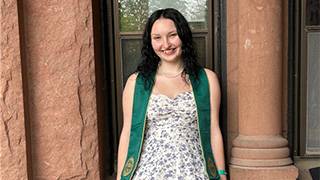 Emily Barbera’s project, Segregation and Pregnancy Outcomes, focuses on exploring the accessibility of C-sections and who has access to them.
This project looks at the relationships between various demographics, such as maternal
education levels, prenatal visits, race and the use of C-sections during birth in
Florida. She is also looking to visualize this data to make the results more accessible
and interactive. Emily notes that her research reveals a great deal about demography,
and that statistical data related to these populations has a strong influence on maternal
and fetal health.
Emily Barbera’s project, Segregation and Pregnancy Outcomes, focuses on exploring the accessibility of C-sections and who has access to them.
This project looks at the relationships between various demographics, such as maternal
education levels, prenatal visits, race and the use of C-sections during birth in
Florida. She is also looking to visualize this data to make the results more accessible
and interactive. Emily notes that her research reveals a great deal about demography,
and that statistical data related to these populations has a strong influence on maternal
and fetal health.
The lack of equitable access to healthcare is a critical issue in this country, and Emily is hoping to help address it in her work. She hopes her project can serve as a reference point for clinicians creating maternal health and birth plans. Emily is using Python and STATA to code and analyze her data and has attended two of her required workshops thus far: “Introduction to Python” and “Research Data Management.” After a few final checks with the regression to ensure everything is working correctly, Emily’s research will be complete. She seeks a way to make an interactive display in PowerBI as a way to share her results.
The DataLab is a groundbreaking research project which will advance research activities across all disciplines of Seton Hall University. It aligns with the Seton Hall strategic plan to broaden research productivity, supports faculty with their research ideas and supports students in exploring research and data analysis careers.
Alshrief remarked, “Frank and Emily’s experience underscores the critical role of Research Data Services (RDS) at Seton Hall University. RDS is a core component of research infrastructure at top-tier (R1) universities. As Seton Hall continues to grow as a research institution, we are already offering that same level of service from advanced software training, methodological consulting and hands-on support for complex data analysis and computational work.” Alshrief continues, “These services are foundational to the current research landscape and essential to attracting and supporting talented faculty and students working on data-intensive projects. RDS work helps bridge the gap between technical capabilities and academic research needs.”
Contact [email protected] with any questions.
Categories: Research, Science and Technology




